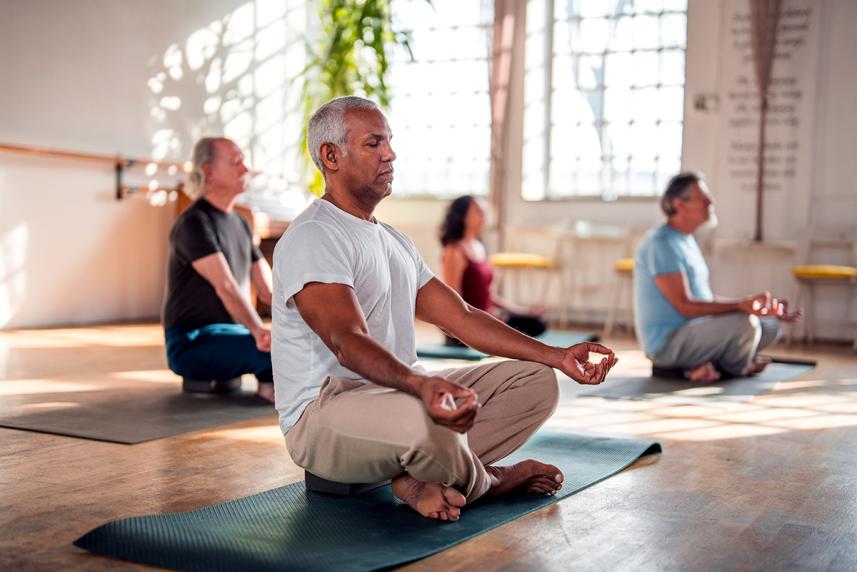Mind over matter: For health and happiness, tune in to your mind-body connection
Try these three simple ways to ease your mind for better health and happiness.

Your emotions: They’re not just in your head. The way you feel — and the thoughts you think — affect your entire body. Studies show that taking care of your mind can improve your mental and physical well-being in lots of unexpected ways. “Your physical health is tied to your emotional health,” says Michelle Riba, M.D., a professor of psychiatry at the University of Michigan in Ann Arbor. “Your emotions affect the way you sleep, the foods you eat, the amount of exercise you do.” It’s all part of the same package.
We’ll show you how to tap into the power of your mind to feel better, stronger, and happier. We turned to Kendal L. Maxwell, Ph.D., a Los Angeles-based clinical neuropsychologist at Cedars-Sinai Medical Center and creator of the 21 Day Positive Mindfulness Meditation Challenge podcast, for these three effective mind-body strategies.
Talk it out
Conversation is a powerful tool for treating depression, anxiety, and insomnia. And cognitive behavioral therapy (CBT) is considered the gold standard for talk therapy. It helps you identify and change unhelpful thought patterns that can keep you from living a happy life. But it can also help you manage long-term physical health conditions like arthritis and high blood pressure. One recent study showed that CBT played a part in reducing tiredness in people with chronic fatigue syndrome and even helped people with diabetes control their blood sugar levels.
When you keep negative feelings in, it can add to stress and impact health over time.
Hashing out your feelings can have a big payoff for your long-term health. In fact, conversation is a powerful tool for treating depression, anxiety, and insomnia. Your job: Hit the release valve in ways that feel good to you. Maybe that’s venting to a friend or resolving a lingering feud with your partner. Talking to a therapist can help too.
Next steps: Connect with a trained counselor — a psychologist, psychiatrist, or clinical social worker who will help you work on practical ways to change negative emotions and thinking patterns to feel better mentally and physically. Find a therapist with the American Psychological Association’s locator tool, or ask your primary care doctor for a referral. Another option: Smartphone apps like Calm and Headspace are effective and super convenient ways to access CBT.
Meditate
Meditation works — for your body and your mind. It’s a way to train your brain to slow down so you can get focused, calm, and quiet. It can reduce stress, improve your attention span and memory, and reduce symptoms of pain and depression. Plus, a review of nine studies found that people who participated in a meditation program actually lowered their blood pressure. “Reducing your blood pressure can lower your chances of stroke and other cardiovascular issues,” explains Maxwell. And doing these practices in a group setting can lower feelings of loneliness and isolation, which can have a big impact on physical well-being.
Next steps: Check local community centers, meditation studios, and social media groups. Or try this short guided meditation from the UCLA Mindful Awareness Research Center. Here’s another easy way to get started:
- Sit comfortably and relax.
- Close your eyes and pay attention to your breath.
- Breathe in as you count to six; breathe out as you count to six.
- Feel your chest rising and falling.
- When distracting thoughts enter your mind, let them go. You can think about them later.
- Continue breathing quietly for about five minutes.
- Gently open your eyes and carry on with your day.
Move mindfully
Movement-based activities like yoga and tai chi can improve your muscle tone, strength, and flexibility, key to staying strong and active as we age. There are many different styles of both yoga (which involves “flowing” from one pose to another) and tai chi (an ancient Chinese practice of slow, focused movements), ranging from slow and controlled to a more athletic, sweaty practice. And not only will regular mindful movement cut stress and boost your mood, research shows it can also improve your digestive health, help you sleep better, and even lower your risk of falling. Plus, says Maxwell, practices like yoga and tai chi may reduce neurodegeneration as we age — that’s the death of nerve cells that can result in conditions like Alzheimer’s disease.
Next steps: Ask your local yoga studio what classes they recommend for newcomers, or check out yoga apps like Down Dog, Daily Yoga, and Yoga for Beginners.


